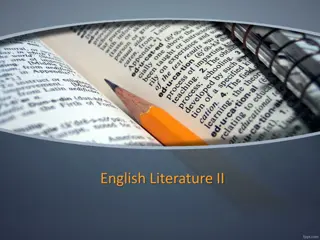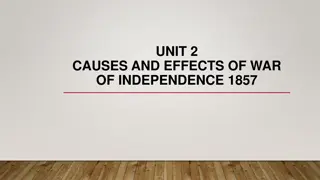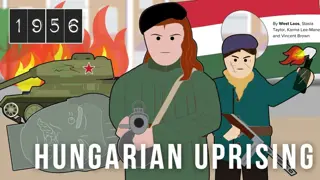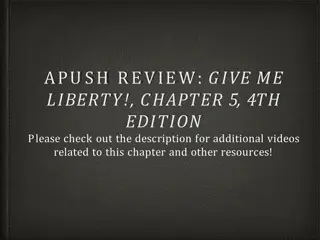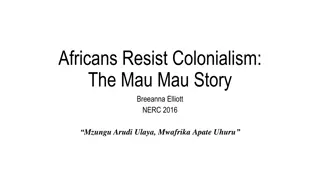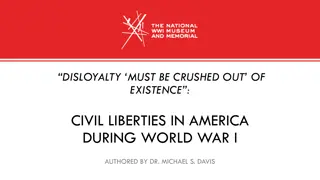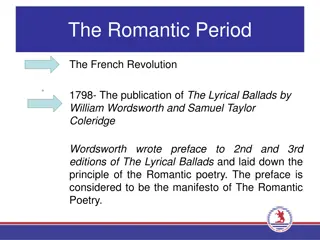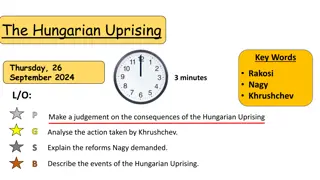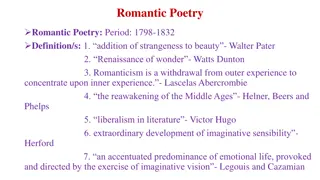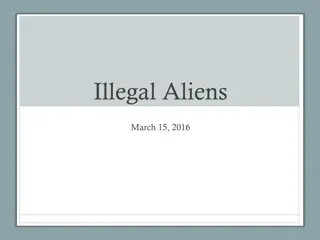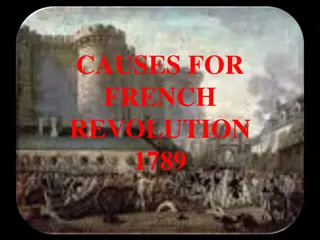Life and Contributions of Auguste Comte: A Pioneer of Sociology and Positivism
Auguste Comte, born in 1798, is renowned as the father of sociology who coined the term. He made significant contributions to social theory, particularly with his "Laws of Three Stages" and the positivist philosophy. Despite personal struggles, he published influential works and left a lasting impac
0 views • 13 slides
Exploring the 1798 Irish Rebellion through Creative Classroom Activities
Dive into the events of the 1798 Irish Rebellion through engaging classroom activities such as drawing historical scenes, reading stories, answering questions, and interacting with classmates. Uncover different perspectives, key figures, movements for reform, and the challenges faced during this sig
0 views • 46 slides
The Romantic Period in English Literature: Embracing Emotion and Individualism
The Romantic period (1798-1837) in English literature was marked by a shift towards valuing emotion, individualism, and nature over rationalism and industrialization. Influenced by societal changes, the movement included prominent poets like William Wordsworth, Samuel Taylor Coleridge, and Robert Bu
0 views • 33 slides
English Poets of the 17th and 18th Centuries
Explore the works of prominent English poets from 1660 to 1798, including John Dryden and Alexander Pope. Discover their use of rhymed couplets, satirical writings, translations, and contributions to the Age of Reason in the eighteenth century. Delve into the poetic reflections on nature, life, deat
0 views • 10 slides
Causes and Effects of the 1857 War of Independence in India
Politically, the Doctrine of Lapse and mistreatment of local Indian leaders contributed to the uprising. Religious tensions arose due to British interference and social inequality. Economically, high taxes and exploitation of Indian wealth fueled the discontent. The military also played a significan
0 views • 17 slides
Hungarian Revolution of 1956: Impact on the Cold War
The Hungarian Revolution of 1956 marked a significant episode in the Cold War era, challenging Soviet dominance and leading to widespread consequences. The uprising, led by Imre Nagy, faced brutal Soviet suppression, resulting in thousands of casualties and reinforcing Soviet control over Hungary. T
0 views • 10 slides
The Crisis Begins: Impact of the Stamp Act and Colonial Resistance
The Crisis Begins Chapter from "Give Me Liberty!" discusses the repercussions of the 7 Years War and the end of salutary neglect, leading to new trade regulations and increased taxation on colonists. The imposition of the Stamp Act without colonial consent sparked widespread resistance, with the eme
0 views • 14 slides
The Mau Mau Uprising in Kenya: A Struggle for Independence
The Mau Mau Uprising in Kenya, also known as the Mau Mau Rebellion, was a significant resistance movement against British colonial rule. Initiated by the Kikuyu ethnic group but involving various tribes, it was fueled by grievances over land dispossession and mistreatment. The rebellion escalated in
0 views • 9 slides
Civil Liberties and Dissent in America: World War I and Beyond
Civil liberties in America during World War I were challenged as state and local governments suppressed anti-war sentiments, leading to the transformation of the Justice Department to counter-subversive actions. Organizations like the NCLB fought for freedom of expression, culminating in the creatio
0 views • 36 slides
The Romantic Period: Influence of the French Revolution on Poetry
The French Revolution of 1798 had a profound impact on poetry during the Romantic Period, exemplified by the publication of "Lyrical Ballads" by William Wordsworth and Samuel Taylor Coleridge. Wordsworth's preface to the collection laid out the principles of Romantic poetry, emphasizing the expressi
0 views • 6 slides
The Hungarian Uprising of 1956: Consequences and Reforms
The Hungarian Uprising of 1956 was a pivotal event in Hungary's history, marked by protests against Soviet oppression and the leadership of Matyas Rakosi. Khrushchev's decision to replace Rakosi with Imre Nagy reflected a shift in Communist leadership. The demands for free speech and withdrawal of S
0 views • 15 slides
Exploring the Romantic Era: Poetry, History, and Major Poets
A detailed exploration of Romantic Poetry from 1798-1832, encompassing the defining characteristics, historical background, major poets including Wordsworth and Keats, and the influence of key events like the French Revolution. Romanticism is characterized by subjectivity, imagination, love for the
0 views • 4 slides
The Story of Nat Turner: From Childhood to Rebellion
Born in 1800, Nat Turner experienced a traumatic childhood marked by slavery and visions from God. Raised in a religious family, he had a deep-seated hatred for slavery. Turner's rebellion in 1831 led to the deaths of many, as he sought to overthrow the oppressive system. His army of 70 slaves wreak
0 views • 16 slides
Understanding Illegal Aliens and Immigration Policy in the United States
The concept of illegal aliens in the United States dates back to the 1798 Alien and Sedition Acts. While U.S. law differentiates between aliens and immigrants, there is no explicit definition of "illegal alien." The Immigration Acts of the 1920s led to the emergence of illegal immigration as a signi
0 views • 6 slides
Causes of the French Revolution in 1789
The French Revolution of 1789 was sparked by a combination of social, administrative, political, intellectual, financial, and immediate causes. Feudalism, a rotten administrative system, absolute monarchy, intellectual influences from philosophers like Montesquieu and Rousseau, financial bankruptcy,
0 views • 10 slides
Overview of Virus Structure and Classification
Viruses were first observed by Edward Jenner in 1798, who noticed their role in providing immunity. They are smaller than bacteria and consist of genetic material surrounded by a protein coat. Viruses are obligate cellular parasites, replicating only inside living cells. The structure of viruses inc
0 views • 38 slides


